Key takeaways:
- Ethics in freelance editing is centered on honesty, transparency, and respect for the author’s voice, highlighting the importance of maintaining trust and confidentiality.
- Editors face common dilemmas, such as balancing an author’s unique style with necessary changes, managing conflicts of interest, and handling sensitive content carefully.
- Maintaining ethical standards involves clear communication, using tailored checklists, and seeking peer feedback to ensure integrity in the editorial process.
- Emerging editors should prioritize continual learning, create clear contracts with clients, and engage in reflective practices to assess biases and improve their ethical approach.
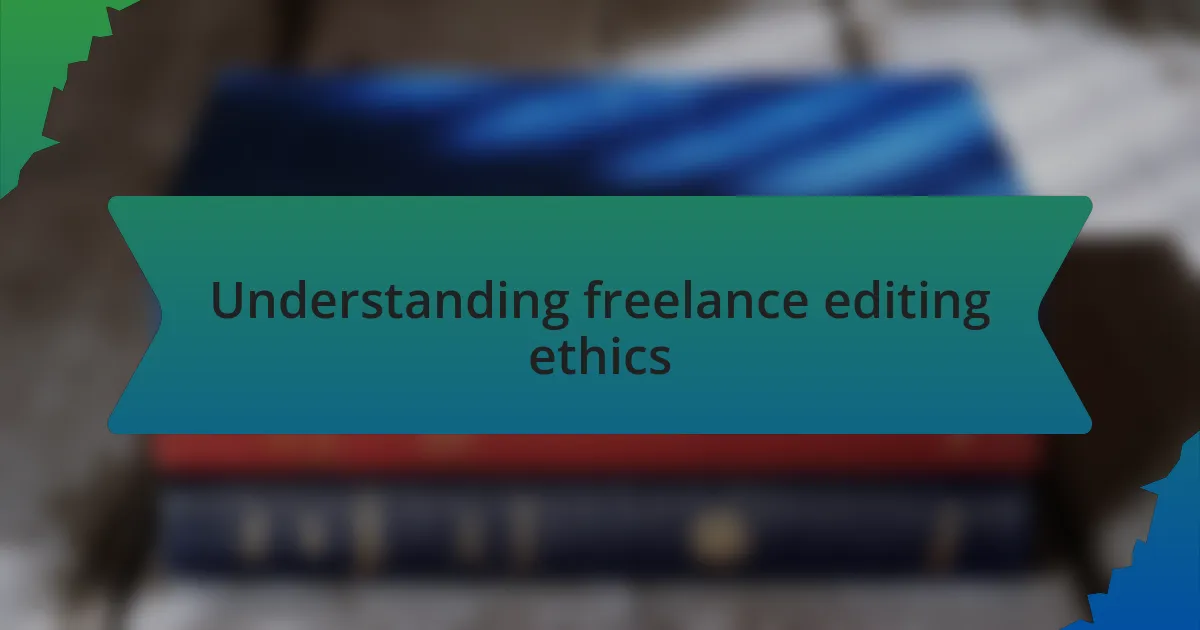
Understanding freelance editing ethics
Freelance editing ethics revolve around the principles of honesty, transparency, and respect for the author’s voice. I remember a time when I worked with an author who had a distinct style, and I had to navigate the fine line between making necessary improvements and preserving their unique voice. Isn’t it essential to strike that balance? It truly makes a difference in how the final product resonates with readers.
One crucial aspect of editing ethics is the commitment to confidentiality. When I first started, I was surprised at how much trust authors place in editors regarding their unpublished work. That realization shaped my approach, reinforcing the belief that respecting an author’s privacy is fundamental to maintaining a professional relationship—wouldn’t you agree that trust is paramount in such collaborations?
Moreover, the concept of fair compensation is often overlooked in discussions about ethics. From my experience, I’ve seen editors undervalue their work due to a lack of industry standards. It begs the question, how can we advocate for ethical practices if we don’t support fair pay? It’s a conversation worth having, as fair compensation plays a vital role in ensuring both editors and authors can thrive in the freelancing landscape.
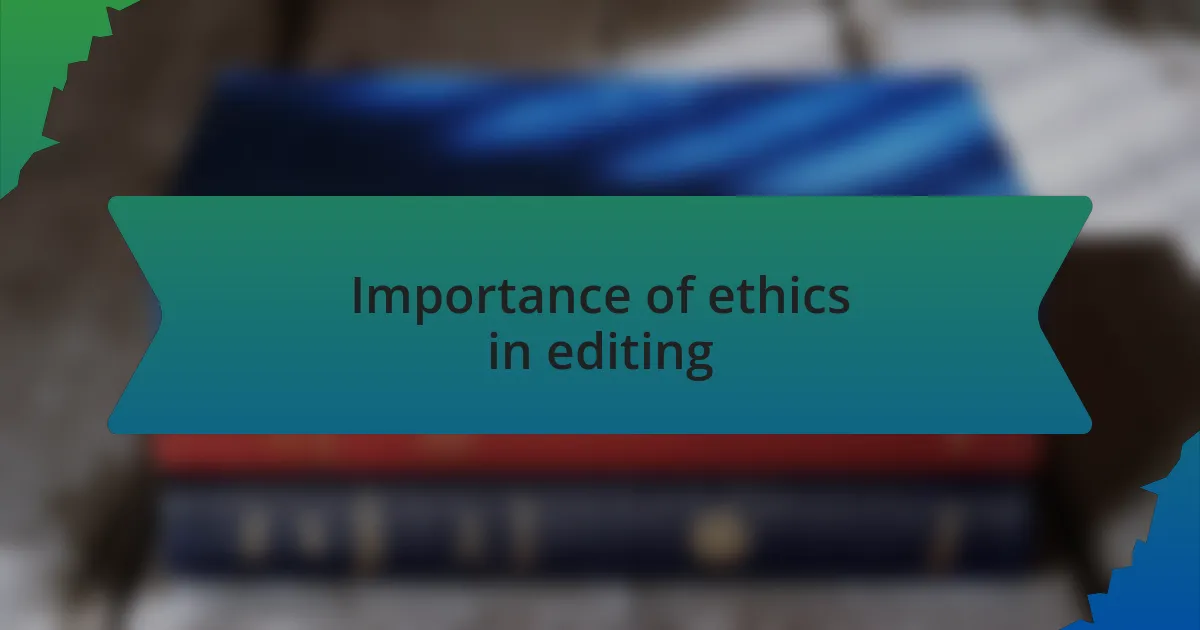
Importance of ethics in editing
Editing is not just about correcting grammar or improving clarity; it’s deeply rooted in ethics that guide our actions. I once faced a dilemma when I found a significant issue in a manuscript that could mislead readers. Confronting the author about it was uncomfortable, but I knew it was my responsibility to ensure accuracy. Isn’t it fascinating how our ethical choices can shape not only the text but also the trust authors place in us?
Additionally, respecting the author’s intention is a critical ethical cornerstone. I recall a project where the author had a compelling but unconventional narrative style. While I had my opinions on how the story could be structured differently, I chose to enhance rather than alter their original vision. How often do we weigh our perspective against the author’s purpose, and why is it vital to get it right? Balancing our expertise with their intent fosters not just a better manuscript but also a strong collaboration.
Ethics in editing extends beyond technical skills; it profoundly impacts the integrity of the publishing process. There was a time when I witnessed a peer cutting corners simply to meet deadlines, ultimately compromising the quality of their work. It made me realize that adhering to ethical practices isn’t just about following rules—it’s about building a reputable industry where quality prevails. Isn’t it true that when we uphold high ethical standards, we elevate not just our work but the entire field of freelance editing?
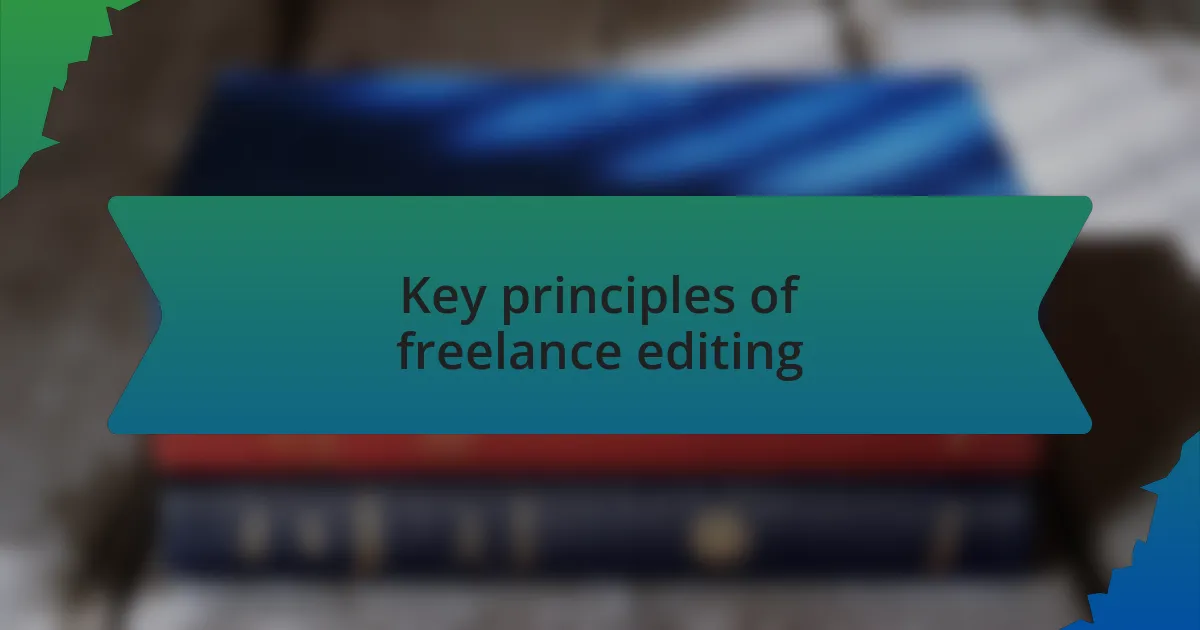
Key principles of freelance editing
One of the key principles in freelance editing is honesty. I remember a time when I read a manuscript that had a great premise but fell flat due to unclear arguments. Instead of merely polishing the surface, I decided to communicate my concerns directly to the author. Reflecting on that experience, I realized how essential it is to provide unvarnished feedback, as it fosters trust and significantly improves the final product.
Another critical aspect is confidentiality. In my early editing days, I worked with a manuscript so unique that the author asked for strict discretion about its content. This taught me that respecting intellectual property is not just a professional obligation; it’s a fundamental respect for the author’s creativity. Have you ever thought about how confidentiality impacts an author’s willingness to share their work? I find it deepens the connection between editor and author, creating a safe space for collaboration.
Lastly, cultural sensitivity stands out as an essential principle in freelance editing. I once edited a memoir that delved into experiences from a different cultural perspective. I realized that understanding the nuances behind the words wasn’t merely a skill; it was about honoring the author’s voice and background. How often do we, as editors, take the time to educate ourselves on diverse cultural contexts? Embracing cultural sensitivity not only enriches our editing but also broadens our understanding of the works we’re privileged to help shape.
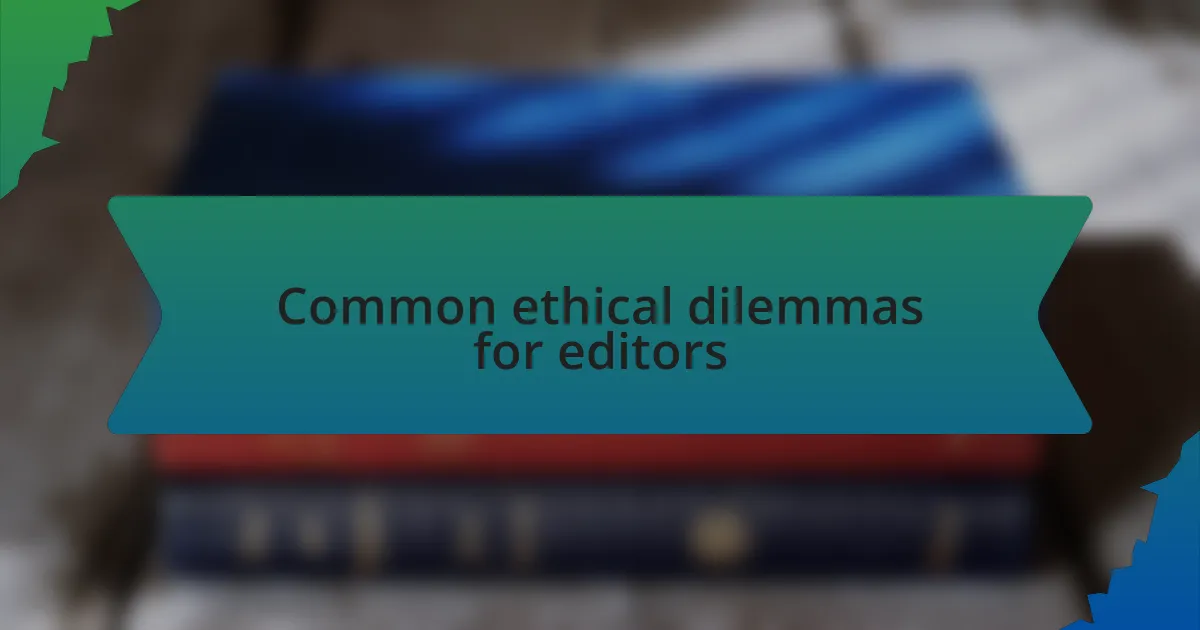
Common ethical dilemmas for editors
One common ethical dilemma for editors is the balance between preserving an author’s voice and suggesting changes to improve clarity. I remember working on a novel where the author had a very distinct style that, while beautiful, often obscured the plot. It was a challenge for me to ask for revisions without diluting their unique voice. How do we navigate that fine line? Ensuring our feedback is constructive while honoring the author’s intent can be quite a tightrope walk.
Another issue that frequently arises is the potential for conflicts of interest. I once took on a project where I discovered the author had connections to a prominent figure I had worked with previously. This put me in a tough spot—do I disclose this relationship? Ultimately, I chose transparency, which I found not only relieved my conscience but also strengthened the professional relationship. Have you faced a similar situation, where your personal connections might influence your work? It highlights the importance of integrity in maintaining trust within the editorial process.
Finally, the question of handling sensitive content presents ethical challenges. I edited a memoir that dealt with trauma, requiring me to tread carefully with language while ensuring the message remained impactful. It made me reflect on the responsibility we hold as editors to protect our authors while still delivering an honest and compelling narrative. How can we strike the right balance? By approaching these topics with empathy and thoughtfulness, we can provide insights that empower rather than exploit.
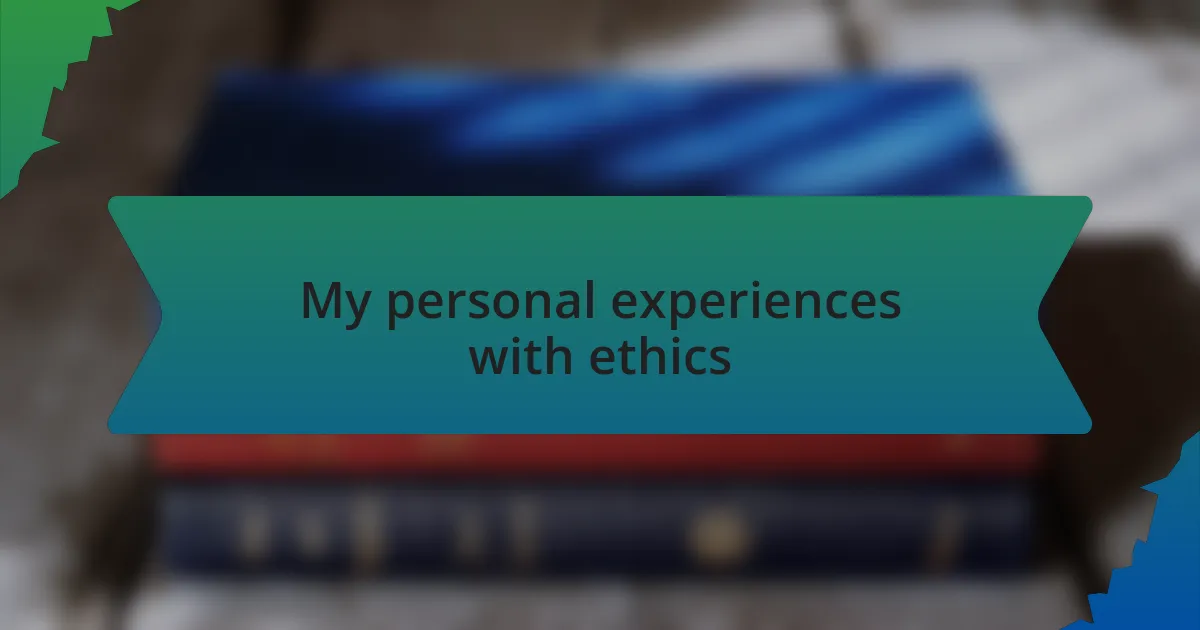
My personal experiences with ethics
Ethics in freelance editing often challenges my sense of responsibility. There was a time when I edited a collection of essays that sought to highlight diverse perspectives. In one instance, an author included a narrative that, while personal, could have harmed others by exposing sensitive family dynamics. It prompted me to question whether my role was solely to polish the text or to advocate for ethical storytelling. How do we protect the innocent while still giving a voice to the author’s truth?
One memorable experience was when a client sent me a manuscript filled with factual inaccuracies. I faced a moral dilemma—should I ignore it, allowing my client to publish flawed work, or risk damaging their pride by pointing it out? I chose the latter, realizing that my commitment to truth is paramount. It reinforced my belief that, as editors, we have a duty to uphold accuracy. Isn’t it better to deliver a painful truth than to let misinformation spread unchecked?
I also remember editing a poetry manuscript that explored themes of mental health. The author’s raw emotion hit me profoundly, but it also raised concerns about potential triggers for readers. I had to navigate that complex territory with utmost sensitivity, ensuring the structure supported the healing narrative without sensationalizing pain. It was a reflective moment—how do we balance artistic expression with social responsibility? This experience taught me that ethical editing often requires us to engage deeply with the content, fostering both empathy and awareness.
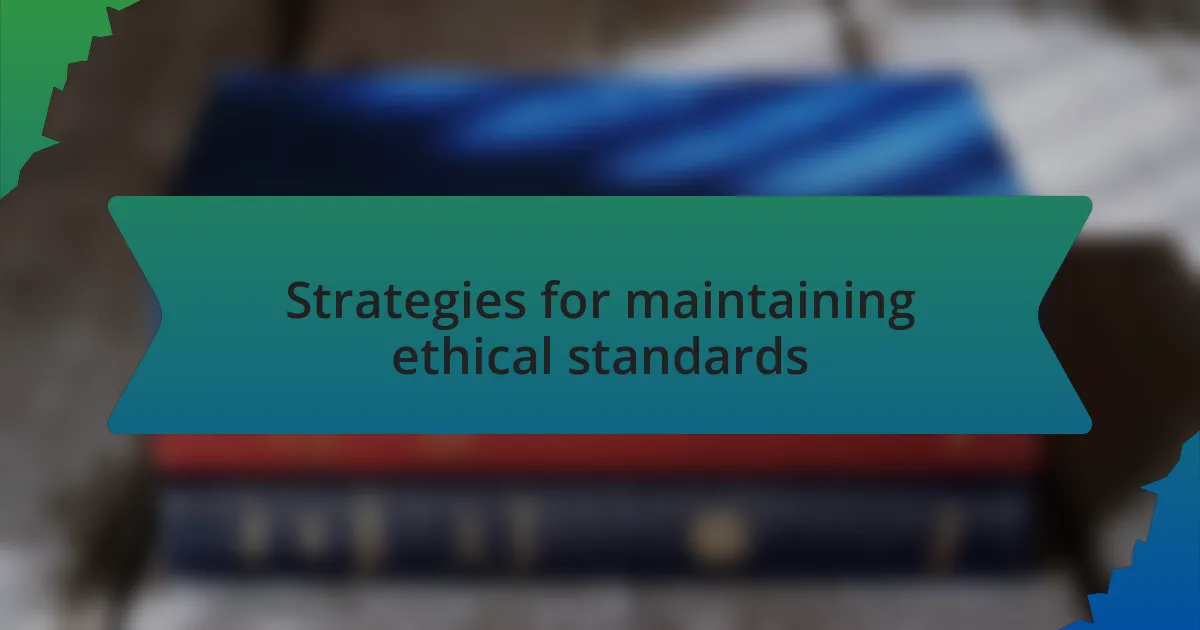
Strategies for maintaining ethical standards
In my journey as a freelance editor, one effective strategy I’ve embraced is establishing clear communication with my clients. Early on, I had a project where I sensed the author had deeply personal motives for their narrative choices. By initiating an open dialogue about the implications of their storytelling, we could collaboratively navigate sensitive topics. This not only strengthened our relationship but also ensured the integrity of the narrative. How often do we consider the potential impact of our work on others?
Another approach is to create a checklist of ethical standards tailored to each project. I recall a time when I was editing a historical account that included contentious opinions. Maintaining a balance between presenting facts and respecting differing viewpoints felt crucial. This strategy helped me assess not just the factual accuracy but also the editorial tone, ensuring the work remained respectful and nuanced. Have you ever thought about how a slight shift in tone can alter the reader’s perception entirely?
Additionally, seeking peer feedback has proven invaluable in maintaining ethical standards. There was a project where my perspective might have been clouded by my personal beliefs. Inviting another editor to review the work allowed for fresh insights and highlighted areas I might have overlooked. It’s fascinating to see how collaboration can pinpoint ethical lapses we sometimes can’t recognize alone. Why not tap into that community for support and growth?
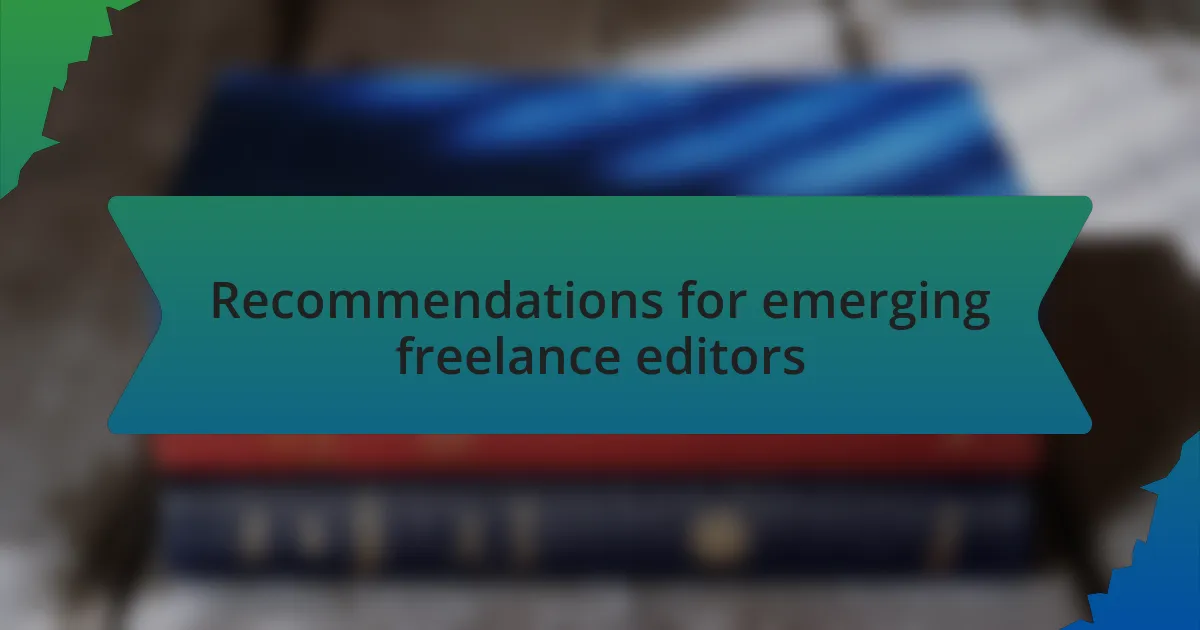
Recommendations for emerging freelance editors
One recommendation for emerging freelance editors is to prioritize continual learning. Early in my career, I discovered the wealth of knowledge available through online courses and workshops. Participating in a workshop on cultural sensitivity opened my eyes to nuanced perspectives I hadn’t considered before. How could I have navigated those tricky editorial choices without that broader understanding?
Another suggestion is to develop a clear contract with clients that outlines not just payment terms, but also ethical considerations. I’ve found that specifying rights regarding content ownership can prevent future disputes and protect both parties. I once worked without a contract, which led to a misunderstanding about the use of my edits in future publications. Have you ever had a similar experience that could have been avoided with clear agreements?
Lastly, I advocate for a reflective practice where editors regularly assess their own biases. Once, after completing a project, I took time to evaluate my approach and realized I had unconsciously favored certain viewpoints over others. This reflection prompted me to actively seek diverse sources and opinions in future assignments. Have you reflected on your editing choices lately? This practice can refine not only your skills but also your ethical compass.